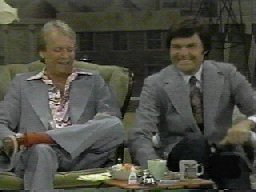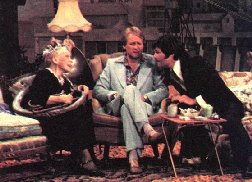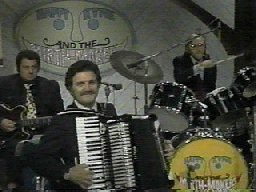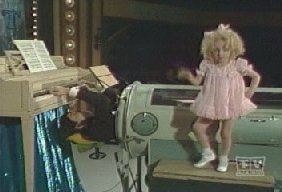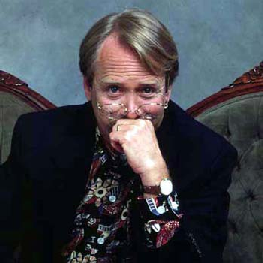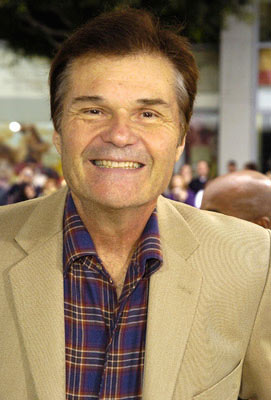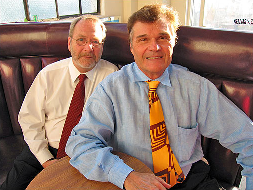Introduced as
the summer replacement for Mary Hartman, Mary Hartman, this was one of
the most talked about programs of 1977. In it, denizens of Fernwood, Ohio
(Mary’s hometown), mounted a talk show on local station WZAZ-TV, Channel 6, down
on Acacia Street. It did look like an ordinary talk show, with desk and couch,
slick, smiling host and eager sidekick, and guests like a piano player, an
insufferable child dancer, and a couple who had lost their son to a religious
cult. But the pianist was rolled out in an iron lung, and proceeded to play a
Mozart sonata upside down and backwards while the Shirley Temple look-alike
tap-danced alongside; the son, whom the parents complained had been programmed
to keep "falling on his knees and mumbling in a foreign tongue," and who always
dressed in black and kept "leading cockamamie parades down church
aisles," turned out to be a Catholic Priest.
Fernwood
2-Night
was a wild, and some said patently offensive, parody on TV talk shows. The host,
Barth Gimble, was natty and egotistical, his sidekick, Jerry Hubbard, a fatuous
idiot (“Any comparison to Johnny Carson and Ed McMahon is, of course, purely
intentional,” smirked Time magazine). Martin Mull had previously appeared
on Mary Hartman, Mary Hartman as Garth Gimble, a wife beater who
eventually impaled himself on an aluminum Christmas tree in the closet. Barth
was presented here as his twin brother, and there were occasional visits by
their father, Garth Sr. The guests were parodies of every mind-numbing act that
ever paraded across the Carson/Douglas/Griffin shows, from Vietnamese refugee,
Mian Co Tiam, who had written a patriotic book titled Yankee Doodle Gook,
to a housewife who was campaigning to have her late Aunt Dora made a saint
because she made "remarkable raisin bread," to a Jewish man named Morton Rose
who had been caught speeding through all-WASP Fernwood. He was brought on
because Barth was sure many of the local viewers had never seen "a person of the
Jewish persuasion." "What tribe are you from?" asked Hubbard. "I'm originally
from Toledo," responded the guest eagerly. Then they opened the phone lines for
a "Talk-to-a-Jew" call-in segment, in which one woman wanted to know, “When is
Barbra Streisand’s next movie coming out?”
The writers of
Fernwood 2-Night spared no one. "We will offend the sensitivities of a
number of Americans, for which we apologize out front," admitted producer Alan
Thicke. "But we're not being discriminating in our satire," he added cheerfully,
"we're offending everybody, regardless of race, creed, color or income level." A
few jokes, though very few, were off-limits. A line about the recent suicide of
Freddie Prinze was deleted; as was a skit about two brothers fighting over
whether to pull the plug on their comatose mother. (“Now,” interjected Gimble,
“is it Mom or the money you want?”)
Other guests
included Linda Barry, owner of the Fernwood Nudist Colony, mechanic Virgil Sims,
Barth's aunt Edity, a couple discussing the La Fromage method of childbirth, the
founder of the Church of the Divine Lemonade, and the Salvation Army Singers
performing "Da Do Ron Ron." Happy Kyne led the ragged, four-piece studio band,
the Mirth Makers, when not touting his franchised dental service.
Although this
bizarre program was only marginally successful in its summer of 1977 run, Norman
Lear brought it back in April 1978 as
America 2-Night.
Barth and Jerry had moved to Alta Coma, California, “the unfinished furniture
capital of the world,” and hoped to boost the show with appearances by major
Hollywood stars. (Many did appear, playing parodies of themselves,
including Charlton Heston, Robin Williams, George Gobel, Elke Sommer, and Gary
Burghoff.) The new series got off to a grand start with a week-long buildup for
"Electrocution Night '78" in which a convict was to be executed on stage while
his wife lined up book, movie and T-shirt deals. Viewers had a chance to
participate by entering an "I would like to throw the switch
because..." contest.


